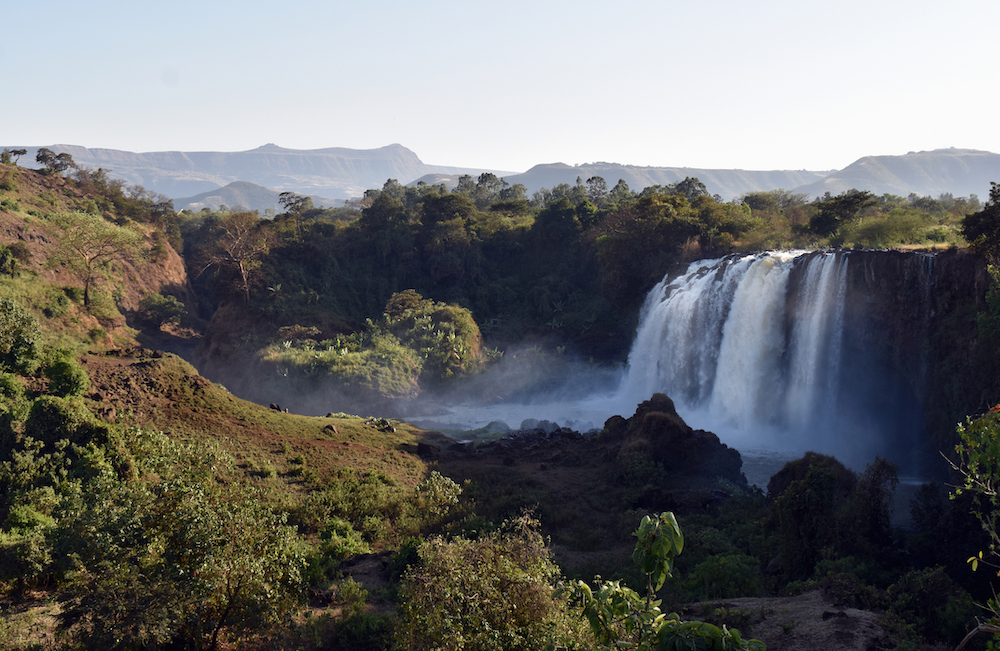- Ethiopia is building a dam to generate cheap hydroelectric power, frustrating Egypt’s attempt to guarantee its water supply.
- The prospect of cheap electricity is expected to generate economic development and create business opportunities in Ethiopia and neighboring countries.
- Access to hydroelectric power would reduce a dependence on dirty sources of energy including wood, while potentially opening up more education opportunities for the region.
Ethiopia wants cheap, clean power. Egypt wants a guaranteed water supply.
That is at the bottom of a decade-long dispute between the countries over a dam being constructed on the Blue Nile. Ethiopia says it needs the Grand Ethiopian Renaissance Dam to provide hydroelectric power to its 115 million inhabitants. Only about a quarter of the population has access to electricity now. Egypt, with about 100 million people, fears the dam will cut its access to fresh water. The desert country gets 90% of its water from the Nile, which is fed by the Blue Nile.
“Critics of the GERD, notably Egyptians, have argued that its construction will have a significantly negative impact on the availability of water to households and farmers in Egypt,” John Mukum Mbaku, a senior fellow at the Brookings Institute, told Karma in an email. “The real problem to Egyptian farmland will depend on the speed with which Ethiopia fills the dam and what Ethiopia is willing to do during droughts.”
Talks between Ethiopia, Egypt and neighboring Sudan broke down last month after Ethiopia said it already achieved its first-year target for filling the reservoir, thanks to a heavy rainy season. Egypt and Sudan, which is also concerned about potential water shortages, are pushing for a legally binding agreement on how the dam would operate during droughts to ensure they receive an adequate supply of water.
The dam is expected to transform the region — sparking development, cutting poverty and boosting education. Because Ethiopia expects to generate more electricity than it needs, the country plans to sell excess power at low cost to as many as 10 of the countries in the region.
“Bringing electricity to rural areas in these countries could serve as a significant impetus to development and poverty alleviation,” wrote Mbaku, who is also an economics professor at Utah’s Weber State University. In addition to “more sustainable industries, they will also be able to significantly improve access to education — children can do their homework at night and schools can remain open longer.”
Also, the dam could end a reliance on wood, cow dung, and other forms of biomass for energy by introducing hydroelectric power, a much cleaner and reliable source, he wrote.
On the flip side, in addition to the concerns of Egypt and Sudan about possible water shortages, the possibility of other negative effects has been raised. Mbaku said some experts claim the plant’s design could lead to water spilling out of its northwestern corner and causing catastrophic floods to downstream communities. Many local households have been forced to relocate due to the construction.
“Dams, by their very nature, create many social problems, including especially the forced resettlement of peoples and the loss of their traditional means of support,” Mbaku wrote. “Nevertheless, they also provide opportunities for economic and social development. Countries and their citizens must recognize the fact that development is not without cost.”
The countries have been negotiating with little success since construction of the $4 billion dam commenced in 2011. When completed, the reservoir, which sits behind what will be Africa’s largest hydroelectric plant when it comes into operation, is expected to hold as much as 74 billion cubic meters of Blue Nile water.
Since the dam is designed to generate hydropower, it will only store water and not divert it for irrigation, wrote Ashok Swain, the UNESCO chair on International Water Cooperation. Still, Egypt is rightfully concerned because large-scale water diversions upstream would have a severe impact on Egypt’s food production and public health.
Egypt has raised the possibility of military action, but Swain wrote he doesn’t believe it’s a “serious possibility.” Egypt doesn’t have overwhelming military superiority now does it share a border with Ethiopia.
Ethiopia said it expects the talks to resume Aug. 10
Meanwhile, average Ethiopians and supporters of the dam flooded the Internet with congratulatory messages on reaching the first stage of filling.
“I proudly & joyously join all my Ethiopian brothers & sisters in celebrating OUR GERD on Aba-I (“Nile”),” tweeted professor Alemayehu G. Mariam of California State University, San Bernardino. “We the people of Ethiopia did the GERD ourselves! God bless the GERD!”






















